|
|
|
Sort Order |
|
|
|
Items / Page
|
|
|
|
|
|
|
| Srl | Item |
| 1 |
ID:
152261


|
|
|
|
|
| Summary/Abstract |
Brunei continued in 2016 to suffer from declining oil and gas prices. The budget deficit grew. The Sultan made economic diversification and “prudent spending” the year’s central political themes. He criticized several government institutions during “surprise visits” and sharply attacked the Ministry of Religious Affairs for “delaying” the full enforcement of an Islamic legal reform.
|
|
|
|
|
|
|
|
|
|
|
|
|
|
|
|
| 2 |
ID:
179257
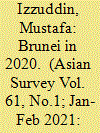

|
|
|
|
|
| Summary/Abstract |
In common with other countries around the world, Brunei Darussalam has had to deal with the coronavirus disease 2019 (Covid19) pandemic and its consequences. By the end of 2020, Brunei had navigated the pandemic storm successfully by keeping its social compact intact, achieving a relatively buoyant economy, exhibiting a balanced foreign policy through strategic hedging, and keeping the country secure through defense diplomacy. Ending 2020 in great shape places Brunei in good stead for assuming the chairmanship of ASEAN and future royal succession.
|
|
|
|
|
|
|
|
|
|
|
|
|
|
|
|
| 3 |
ID:
171899
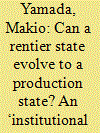

|
|
|
|
|
| Summary/Abstract |
Can a rentier state evolve to a production state? This article attempts to answer this question by analysing how historically states evolved to production states and by comparing their experience with today’s Gulf states. Although the Gulf states show some productive traits today, their mode of production largely remains ‘production with rentier characteristics’, that is reliant on oil-driven advantages. Their further economic diversification requires improved governance capabilities that enable their government to enhance human capital. Production states around the world acquired such governance capabilities through ‘institutional upgrading’, a replacement of clientelistic institutions with meritocratic ones. While clientelistic institutions tend to persist, such institutions were significantly reduced in these states through the exit of vested-interest players from major fiscal and organizational spaces. The exit appears to occur when these vested-interest players accept pain-sharing to ensure their protection in the context of the revealed vulnerability of their patron regime and when alternative productive gains are offered to them in lieu of conventional distribution. Presently neither condition is in existence in the Gulf states, which continue to be characterized by their direct and extensive distributional regimes. Without a prospect for immediate governance improvement, a realistic reform possibility lies in agency under institutional constraints.
|
|
|
|
|
|
|
|
|
|
|
|
|
|
|
|
| 4 |
ID:
171484
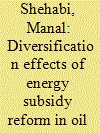

|
|
|
|
|
| Summary/Abstract |
For oil exporters, energy subsidy reform and economic diversification are critical policy responses to recent fundamental changes in the global oil market and oil price declines, yet the relationship between them is little understood. This article investigates linkages between energy subsidy reform and accelerating economic diversification away from hydrocarbons in a low oil price environment, using illustrations from Kuwait. It employs an economy-wide, general equilibrium model with oligopolistic industrial structure, the first of its kind for an economy in the Middle East and North Africa, that embodies unique elements of the country's economic structure—oil dependence; public sector dominance; subsidies; sovereign wealth funds; industrial collusive pricing behaviour; and guest workers. The article argues that, contrary to common popular discourse, Kuwait's economy has a diversified economic base, but this base fails to diversify export or government revenue needed for economic sustainability. Results show that weak economic diversification in oil exporters with a similar economic structure is not primarily due to “Dutch disease,” as dominant in the literature, but to economic constraints and distortions that impair structural change and exacerbate overdependence on hydrocarbons. Labour and competition reforms relax some constraints, achieving large efficiency gains that extend economy-wide and can expand non-energy tradable sectors. The analysis has important policy implications. First, the potential role of pricing regulation in small economies in moderating economic impacts of negative oil shocks. Second, in oil economies characterized by pervasive oligopolies, microeconomic reform can be a channel to achieve efficiency and better diversification effects of subsidy reform.
|
|
|
|
|
|
|
|
|
|
|
|
|
|
|
|
| 5 |
ID:
177208


|
|
|
|
|
| Summary/Abstract |
Given its limited oil and gas resources compared to its neighbours, energy diversification has been Oman’s stated goal since at least the 1980s. Yet, this paper argues that, due to the country’s structure of power generation, both issues of economic diversification and energy security are intimately linked and cannot be dissociated. Oman’s national policy for the energy sector, the political and economic challenges of the energy subsidy reforms implemented since the mid-2010s and the energy priorities as highlighted in the new long-term “Oman Vision 2040” national strategy are examined here. This paper also shows that the energy debate has played a critical role in the shaping of Oman’s foreign policy towards its Gulf Cooperation Council (GCC) counterparts, Iran and India, out of a desire to keep Oman’s –– more symbolic than real –– independence in working out its energy needs.
|
|
|
|
|
|
|
|
|
|
|
|
|
|
|
|
| 6 |
ID:
169447
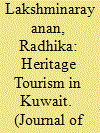

|
|
|
|
|
| Summary/Abstract |
Recent volatility in oil markets and the economic constraints of a budget deficit are compelling “rentier” states like Kuwait to seek various avenues for economic diversification. This article suggests that promoting heritage tourism could potentially transform the economy and propel tourism growth overall. It seeks to identify the prospects for heritage tourism development through an exploration of the tangible and intangible heritage of Kuwait. The paper provides an insight into challenges and constraints facing heritage tourism development in Kuwait including the need for training, education, image branding and marketing. Finally it suggests a framework for sustainable heritage tourism. Primary data was collected through field work in heritage institutions and museums and informal interviews with staff and visitors, and complemented by institutional brochures, official websites, newspaper reports, tourist information and government databases.
|
|
|
|
|
|
|
|
|
|
|
|
|
|
|
|
| 7 |
ID:
127884
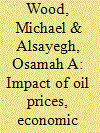

|
|
|
|
|
| Publication |
2014.
|
| Summary/Abstract |
This paper describes the influences of oil revenue and government's policies toward economic developments and energy efficiency on the electricity and water demands. A Kuwait-specific electricity and water demand model was developed based on historic data of oil income, gross domestic product (GDP), population and electric load and water demand over the past twelve years (1998-2010). Moreover, the model took into account the future mega projects, annual new connected loads and expected application of energy conservation programs. It was run under six circumstances representing the combinations of three oil income scenarios and two government action policies toward economic diversification and energy conservation. The first government policy is the status quo with respect to economic diversification and applying energy conservation programs. The second policy scenario is the proactive strategy of raising the production of the non-oil sector revenue and enforcing legislations toward energy demand side management and conservation. In the upcoming 20 years, the average rates of change of the electric load and water demand increase are 0.13 GW and 3.0 MIGD, respectively, per US dollar oil price increase. Moreover, through proactive policy, the rates of average load and water demand decrease are 0.13 GW and 2.9 MIGD per year, respectively.
|
|
|
|
|
|
|
|
|
|
|
|
|
|
|
|
| 8 |
ID:
086242
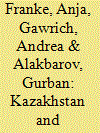

|
|
|
|
|
| Publication |
2009.
|
| Summary/Abstract |
This article presents an analysis of two post-Soviet states, Kazakhstan and Azerbaijan, which can be identified as post-Soviet rentier states. Both countries are characterised economically by enormous national resources of gas and oil and low economic diversification as well as politically by strong autocratic presidentialism with neopatrimonial structures. These two factors, combined with further post-Soviet legacies such as a low level of political interest in the respective societies and a basically hierarchical orientation of the population, lead to a specific post-Soviet variety of rentierism. From a political science perspective, this article reveals the impact of resource policies on these comparably new political systems and concludes with a summary of core features of these post-Soviet rentier states.
|
|
|
|
|
|
|
|
|
|
|
|
|
|
|
|
| 9 |
ID:
167216
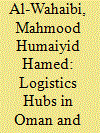

|
|
|
|
|
| Summary/Abstract |
Oman is taking remarkable steps to develop its logistics sector to be one of the main pillars of the nation’s non-oil-based economy in the future. The current fluctuation in oil prices has pressured the country to boost non-oil exports and re-exports to eventually replace oil export in the future as the main income. The aim of this research is to utilize an augmented form of gravity model to investigate the effect of GDP, population growth, distance, free trade agreements (FTAs), political relations, and cultural similarity on the value of non-oil exports and re-exports with the top 35 trading partners. This work sets the foundation for researchers to better understand the spatial placement of logistics hubs in Oman and the political influence on the national economy. Similarly, this analysis could be used by port operators and local authorities as a way to re-evaluate expansion plans of ports and investments in the logistics sector justified by realistic forecasted demands and scenarios. Undoubtedly, the study reaffirms the importance of scenario planning and forecasting to provide decision-makers with better look into the future to make more informed decisions.
|
|
|
|
|
|
|
|
|
|
|
|
|
|
|
|
| 10 |
ID:
135040
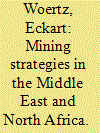

|
|
|
|
|
| Summary/Abstract |
This article provides a mapping exercise of the economic importance of non-hydrocarbon minerals (nhm) in the Middle East and North Africa (mena) and shows how governments in the region increasingly perceive them as strategic resources. The focus is on Saudi Arabia and other Gulf countries, Turkey, Morocco and Iran. nhm like iron ore, phosphates, aluminium and uranium are important for development models in the region, either as export commodities or as vital input factors. Since the 1990s, and as elsewhere in the world, the sector has witnessed privatisation and the promulgation of new mining codes. Yet governments have retained core capabilities and manage most key commodities themselves either directly or indirectly. Mining projects have met with opposition from labour representatives. They also have considerable environmental impact. The article discusses rentier state and resource curse theories, but argues that nhm have also increased development options and have contributed to economic diversification rather than being just a curse.
|
|
|
|
|
|
|
|
|
|
|
|
|
|
|
|
| 11 |
ID:
189294
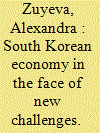

|
|
|
|
|
| Summary/Abstract |
The South Korean economic miracle is often used as an example of the consolidation of business and government in the interests of national prosperity. Thanks to rapid industrialization and the implementation of an export-oriented economic model, the Republic of Korea (ROK) acquired the status of a developed country already in the mid-1990s. An important factor of South Korea's success at the global level is the fact that the foreign economic relations of the ROK have been closely intertwined with access to world markets, technologies, and investments. However, the economic crisis triggered by the COVID-19 pandemic and global geopolitical differences have been testing even the most stable economies. Since the South Korean economy has been deeply integrated into international trade and finance, it has become very vulnerable to outside challenges. The strengthening of partnership cooperation with the US requires that President Yoon's administration dramatically diversify foreign economic ties. Of special interest here are Russian-South Korean economic ties and their prospects. At present, the two countries' economic partnership is facing a major test in the form of sanctions pressure on the Russian Federation. As for domestic challenges for South Korea, the new administration of President Yoon has inherited many unresolved problems that have only been worsening - primarily unemployment (especially among young people), inflation, a housing crisis, and the country's aging population. In this article, the authors analyze current foreign and domestic challenges facing the ROK economy. In addition, emphasis is placed on issues of Russian-South Korean economic relations.
|
|
|
|
|
|
|
|
|
|
|
|
|
|
|
|
|
|
|
|
|